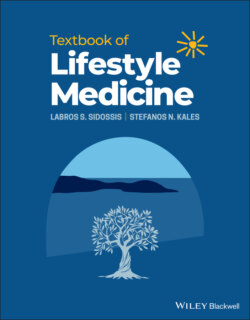Читать книгу Textbook of Lifestyle Medicine - Labros S. Sidossis - Страница 69
Lifestyle‐Induced Epigenetic Alterations and NCD Risk
ОглавлениеAs mentioned in Chapter 2, the genetic background plays an important role in the development of several degenerative diseases. Nevertheless, the expression of genes that gives a variety of phenotypes linked to chronic diseases can be influenced by factors other than heritability. These factors and processes may be of developmental nature, occurring both in utero and during childhood, they may be chemicals found in the environment, drugs and/or pharmaceuticals, or caused by the aging progress and poor dietary habits (Figure 3.7). Provided that these parameters do not alter the DNA sequence but only the way genes act and are expressed, they are thought to exert an additional effect on the conventional genetic inheritance, thus characterized as epigenetic mechanisms – with the prefix epi‐ deriving from the Greek prefix επÌ‐ meaning over, outside of, around.
The term epigenetic mechanisms refers to the parameters involved in the modifications of gene regulation, including DNA methylation, histone modifications, and RNA‐based mechanisms. Nutrigenomics is the epigenomics sector focusing on the effects of food and food constituents on gene expression. For example, adoption of a Mediterranean diet pattern rich in olive oil for 3 years can reduce the detrimental effects of the risk variant of the IL‐6 gene, associated with weight gain, among middle‐aged and older persons with high CVD risk. Compared to the noncarriers and those heterozygous for the risk allele of the IL‐6 gene, the homozygous ones had higher adiposity indexes pre‐intervention, but after three years on the Mediterranean diet rich in olive oil, they appeared to have the most weight loss.
FIGURE 3.7 Epigenetic mechanisms.
Source: National Institutes of Health (2018).
